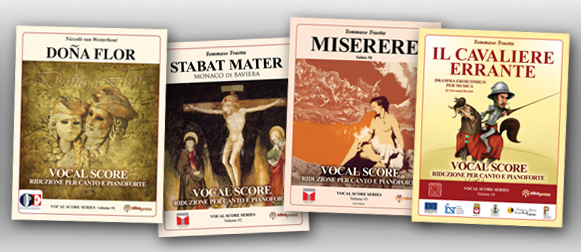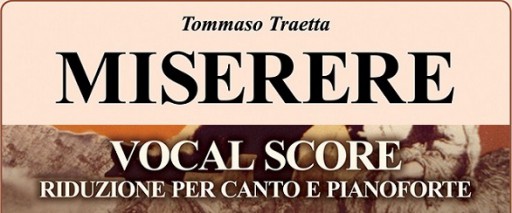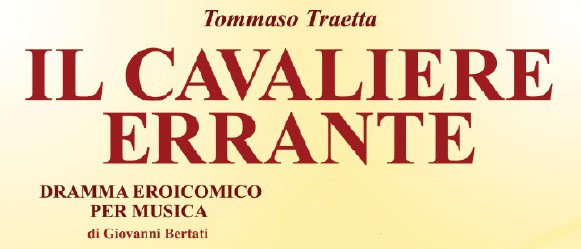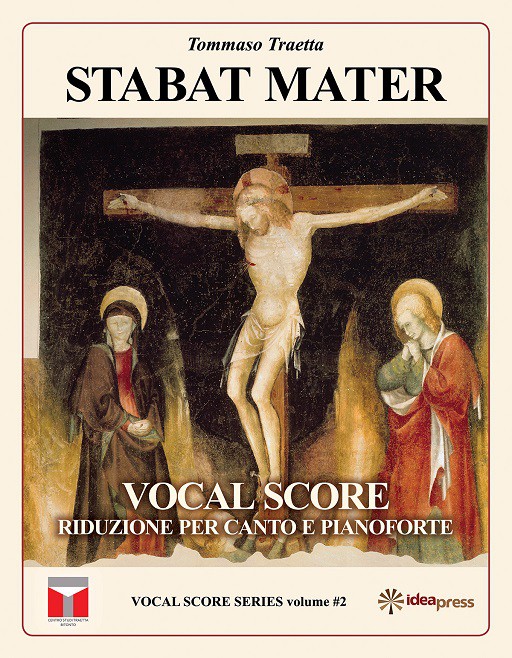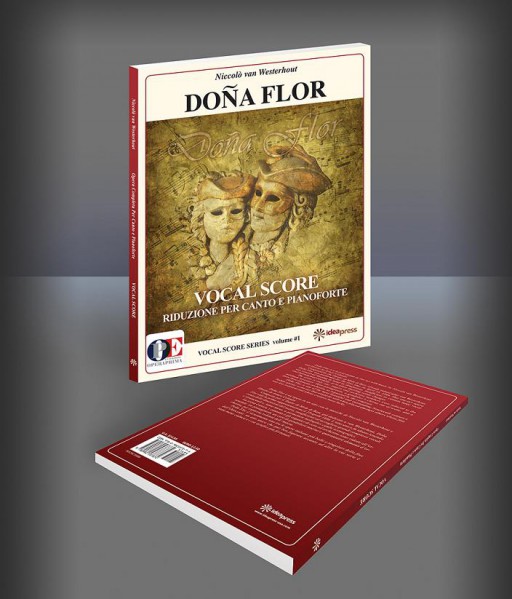Idea Press’ Music Scores Series
The Miserere, Psalm 50 of the Vulgata, interprets the feelings of repentance of David, King of Israel, guilty of adultery and murder.
Tommaso Traetta, thanks to the unique features of the Female Conservatory of Ospedaletto, had first brought into liturgical music the “virtuous” style without betraying the sacredness of the genre.
This composition presents, as a whole, a great structural balance. The alternation of solo Arias and choral pieces emphasizes the personal and universal sense of sin expressed by the sacred poet and intensely interpreted by the musician with unique adherence to the text.
Available with biography of the author and brief history of the composition in four languages…
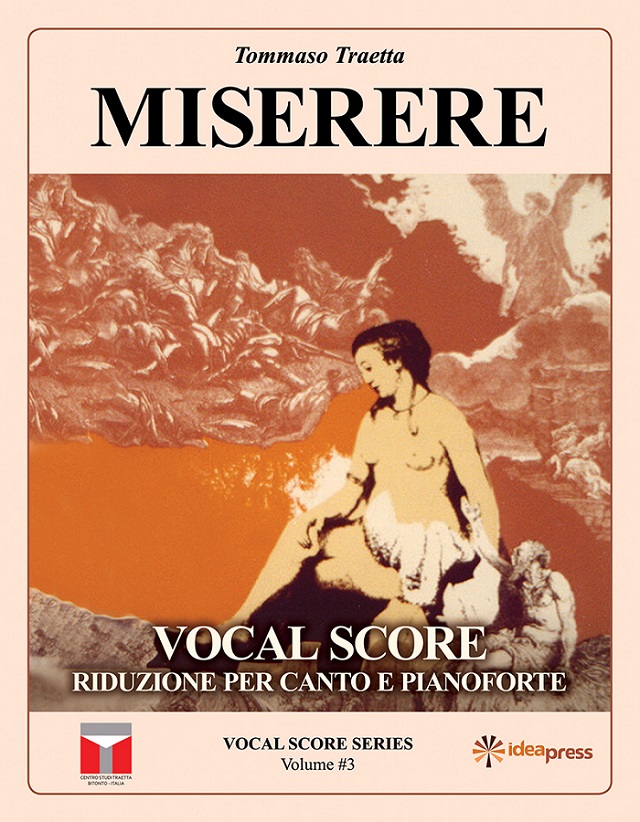
Buy it on Amazon or Barnes & Noble!!
“Il Cavaliere Errante” Vocal Score by Tommaso Traetta gets published for the first time!!
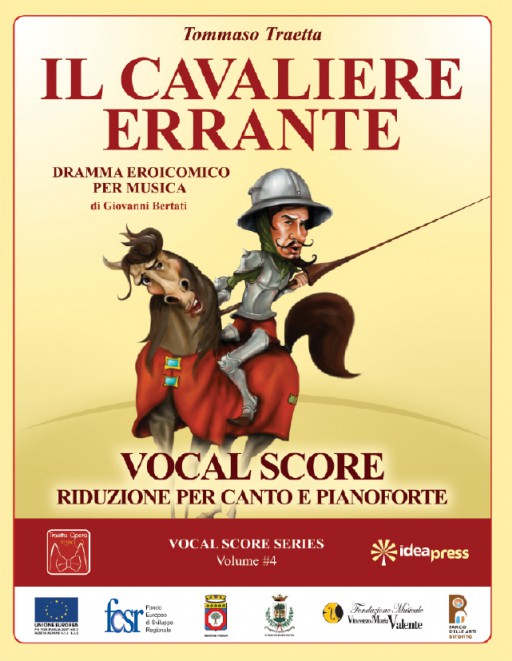 IL CAVALIERE ERRANTE
IL CAVALIERE ERRANTE
DRAMMA EROICOMICO PER MUSICA
Vocal Score/Riduzione per Canto e Pianoforte
Edited by: Vito Clemente and Roberto Duarte
Copyright @ 2015 Idea Press Musical Edition USA
All rights reserved: Traetta Opera Festival
Published by: Idea Press USA
Il Cavaliere Errante, dramma eroicomico (1778) appartiene all’ultimo periodo creativo di Tommaso Traetta: qui ha innanzi tutto sviluppato il lato amabile del suo talento sino all’originalità ed ha acquisito leggerezza nell’espressione musicale. L’opera è in sostanza una favola: un principe spagnolo fa rapire la dama della quale è innamorato, la confina in un’isola incantata e lì, con i sortilegi di un mago, tenta di convincerla a sposarlo. La dama è però innamorata del Cavaliere Errante che, grazie all’aiuto di una maga buona ed insieme al fedele servo, riesce ad annullare i sortilegi, a liberare l’amata e a sposarla.
La partitura è ricca di parodie, di recitativi ed arie virtuosistiche per tutti i personaggi e presenta alcuni tòpoi utilizzati dai suoi successori, da Mozart a Rossini.
Acquistatelo su AMAZON, BARNES & NOBLE e altre librerie internazionali…
Il Cavaliere Errante (The Errant Knight), a comic-heroic drama, belongs to the last creative period of Tommaso Traetta: here he first developed the amiable side of his talent arriving to originality and acquired lightness in his musical expression. The opera is essentially a fairy tale: a Spanish prince makes his men abduct the lady whom he is in love with, he holds her prisoner in an enchanted island, and there, with the aid of the spells of a magician, tries to convince her to marry him. The lady, however, is in love with the Errant Knight who, with the help of a good witch and with his faithful servant, is able to dissolve the incantations, free his beloved and marry her.
The score is full of parodies, recitatives and virtuosic arias for all the characters and presents some topoi used by his successors, from Mozart to Rossini.
Buy on AMAZON, BARNES AND NOBLE and other International bookstores.
THE MUNICH VERSION OF THE STABAT MATER BY TOMMASO TRAETTA IS NOW AVAILABLE!!!
Tommaso Traetta (Bitonto 1727 – Venezia 1779)
The Munich version of the Stabat Mater by Tommaso Traetta (1767) was found in Munich (Germany) in 1994 and performed the following year in the first modern day’s performance in the seventeenth century’s Chiesa del Carmine, at Bitonto’s Maria Cristina Institute. Compared to the Naples version of the Stabat Mater, which was composed ten years earlier, and that has been defined by Damerini as “a valuable page of sacred music of the eighteenth century”, this version exudes a radical religiosity that shakes the soul and becomes a reason for meditation and asceticism in line with the Lauda by Jacopone da Todi. Music and lyrics reach a suffered and humane intensity in the more mature Traetta, in a perfect parallel between the approach to Golgotha and the transition from earthly life to eternal life of the blessed admitted to contemplating the face of God.
Tommaso Traetta (Bitonto 1727 – Venezia 1779)
Lo Stabat Mater di Monaco (1767) di Tommaso Traetta è stato rinvenuto a Monaco di Baviera nel 1994 ed eseguito l’anno successivo in prima esecuzione in tempi moderni nella seicentesca Chiesa del Carmine, presso l’Istituto Maria Cristina di Bitonto. Rispetto allo Stabat Mater di Napoli di dieci anni prima – definito dal Damerini “una pregevole pagina di musica sacra del Settecento” – emana una religiosità radicale che scuote l’animo e diventa motivo di meditazione e di ascesi in linea con la Lauda di Jacopone da Todi. Musica e parola raggiungono una intensità sofferta ed umana nel Traetta maturo, in un ideale parallelismo tra l’avvicinarsi al Golgota ed il passaggio dalla vita terrena a quella eterna dei beati ammessi alla contemplazione del volto di Dio.
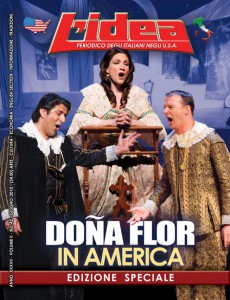 Opera Prima Enterprises is a company aimed at promoting Italian Opera works around the world. In the past years, it has assisted in bringing the opera Doña Flor by Niccolò van Westerhout to USA for the first time. Opera Prima has also funded the re-arrangement of the original score of that opera to allow orchestra to play it as the composer meant it to. The orchestra score is available for use in public concerts for a small fee, meant to help fund other projects of this type. For the orchestra score, please contact by email: idea1000@aol.com
Opera Prima Enterprises is a company aimed at promoting Italian Opera works around the world. In the past years, it has assisted in bringing the opera Doña Flor by Niccolò van Westerhout to USA for the first time. Opera Prima has also funded the re-arrangement of the original score of that opera to allow orchestra to play it as the composer meant it to. The orchestra score is available for use in public concerts for a small fee, meant to help fund other projects of this type. For the orchestra score, please contact by email: idea1000@aol.com
Doña Flor è un’opera in un atto con musiche di Niccolò van Westerhout e libretto di Arturo Colautti, che andò in scena per la prima volta il 18 aprile 1896.
Composta per il teatro di Mola di Bari già dedicato a van Westerhout, Doña Flor fu ideata tenendo conto delle sue dimensioni, insufficienti ad accogliere grandi complessi vocali e strumentali, e tanto meno a permettere molteplici cambi scenografici.
La scena è unica, cantanti e orchestrali sono ridotti allo stretto necessario: tre protagonisti, un coretto di gondolieri fuori campo. Per la rappresentazione di Mola, l’organico dell’orchestra prevedeva quarantatré elementi, per volontà dell’autore, tra archi, fiati, arpa e timpani. Dall’orchestra ben calibrata, fonte d’infinite gradazioni sinfoniche e psicologiche, Niccolò attinge con l’accortezza di non coprire il canto.
Doña Flor è una tra le opere italiane più belle e singolari della fine dell’Ottocento; un’opera che può ben figurare accanto ad altre la cui sorte è stata meno caduca e i cui artefici più fortunati.
- Paperback: 154 pages
- Language: English
- ISBN-10: 0982537379
- ISBN-13: 978-0982537374
AVAILABLE NOW FROM AMAZON.COM, BARNES & NOBLE AND MOST MUSIC BOOKSELLERS


